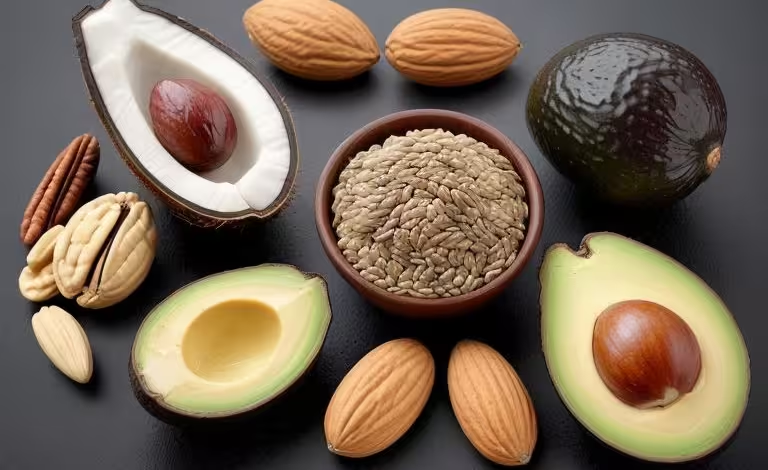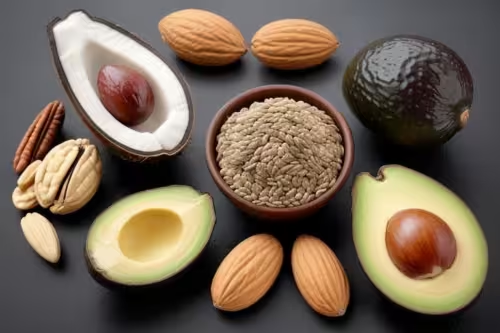7 Healthy Fats to Lower Bad LDL Cholesterol Naturally

7 Healthy Fats to Lower Bad LDL Cholesterol Naturally
How to Manage High Cholesterol: The Best Healthy Fats for Your Diet
High cholesterol is a serious health issue that many people face today. This condition involves an excess of cholesterol, a fatty, waxy substance in the blood. While your body needs cholesterol to make new cells and produce hormones, too much of it can lead to severe health problems like heart attacks and strokes. In this article, we’ll explore the top seven healthy fats you can add to your diet to manage cholesterol levels naturally.
Understanding Cholesterol: Why It’s Important to Control It
Cholesterol is crucial for producing healthy cells, but high levels of low-density lipoprotein (LDL) cholesterol, often referred to as “bad” cholesterol, can increase the risk of heart disease. LDL cholesterol can build up in the walls of your arteries, leading to plaque formation that narrows or blocks the arteries. This condition can cause heart attacks or strokes. Therefore, managing your cholesterol is essential for maintaining heart health.
Avocados: The Superfood for Your Heart
Avocados are rich in monounsaturated fats, which are known to lower LDL cholesterol and raise high-density lipoprotein (HDL) cholesterol, the “good” cholesterol. Besides healthy fats, avocados are packed with fiber, vitamins, and minerals, making them a great addition to your diet for overall heart health. Add avocados to your salads, sandwiches, or enjoy them as guacamole to benefit from their cholesterol-lowering properties.
Nuts and Seeds: Small but Mighty
Nuts and seeds are excellent sources of healthy fats, including omega-3 fatty acids and monounsaturated fats. These fats can help reduce LDL cholesterol and inflammation. Almonds, walnuts, chia seeds, and flaxseeds are particularly beneficial. A handful of these nuts and seeds as a snack or sprinkled on meals can significantly improve your heart health.
Olive Oil: A Staple of Mediterranean Diet
Olive oil is a cornerstone of the Mediterranean diet, well-known for its heart-health benefits. It’s rich in monounsaturated fats and antioxidants, which help lower LDL cholesterol and reduce inflammation. Use olive oil in your cooking, dressings, and marinades to take advantage of its heart-protective properties.
Fatty Fish: Omega-3 Powerhouse
Fatty fish like salmon, mackerel, and sardines are high in omega-3 fatty acids, which are excellent for heart health. Omega-3s help lower triglycerides and raise HDL cholesterol. Including fatty fish in your diet at least twice a week can help reduce the risk of heart disease and improve overall cardiovascular health.
Coconut: A Controversial Choice with Benefits
Coconut oil, milk, and shredded coconut have been popular in various cuisines. Despite being high in saturated fats, coconut contains medium-chain triglycerides (MCTs) that have been shown to have positive effects on cholesterol levels. Consuming coconut products in moderation can be beneficial for your heart.
Dark Chocolate: A Sweet Treat for Your Heart
Dark chocolate, particularly those with 70% or higher cocoa content, is rich in antioxidants called flavonoids. These antioxidants can help lower LDL cholesterol and reduce the risk of heart disease. Enjoying a small piece of dark chocolate can be a delicious way to protect your heart.
How to Incorporate These Healthy Fats into Your Diet
Adding these healthy fats to your diet can help you manage high cholesterol naturally. However, it’s important to remember that balance is key. Here are some tips for incorporating these fats into your daily routine:
- Avocados: Spread on toast, add to smoothies, or use in salads.
- Nuts and Seeds: Enjoy as a snack, sprinkle on yogurt, oatmeal, or salads.
- Olive Oil: Use for cooking, dressings, and marinades.
- Fatty Fish: Grill, bake, or steam for lunch or dinner.
- Coconut: Use coconut oil in cooking, add coconut milk to smoothies or curries.
- Dark Chocolate: Enjoy a small piece after meals.

Tips for Managing High Cholesterol
While diet plays a significant role in managing cholesterol, it’s not the only factor. Here are additional tips to help you keep your cholesterol levels in check:
- Exercise Regularly: Aim for at least 30 minutes of moderate exercise most days of the week.
- Maintain a Healthy Weight: Losing even a small amount of weight can help improve your cholesterol levels.
- Avoid Trans Fats: Found in many processed foods, trans fats can raise LDL cholesterol and lower HDL cholesterol.
- Limit Saturated Fats: Reduce intake of red meat and full-fat dairy products.
- Increase Fiber Intake: Foods high in soluble fiber, such as oats, beans, and lentils, can help lower LDL cholesterol.
Managing high cholesterol is crucial for maintaining heart health and preventing serious health issues like heart attacks and strokes. By incorporating these seven healthy fats into your diet, you can naturally lower your LDL cholesterol levels and improve your overall heart health. Remember, a balanced diet, regular exercise, and healthy lifestyle choices are key to managing cholesterol effectively. Start making these changes today and enjoy a healthier, happier heart.




